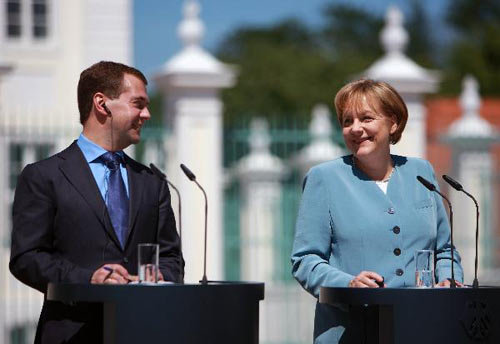Global General
Germany, Russia seek common ground on wide range issues
(Xinhua)
Updated: 2010-06-06 11:37
 |
Large Medium Small |
MESEBERG, Germany - Germany and Russia urged the international community to "stand together" over Iran's disputed nuclear activities and agreed on a new EU-Russia security platform to discuss political and economic challenges, heads of the two countries announced here Saturday.
 |
|
German Chancellor Angela Merkel (R) and visiting Russian President Dmitry Medvedev give a press conference at the Meseberg Residence, 60 kilometers north of Berlin, Germany, June 5, 2010. [Xinhua] |
German Chancellor Angela Merkel held a two-day informal meeting with Russian President Dmitry Medvedev on Friday at the state guesthouse Meseberg Palace, 60 kilometers north of Berlin. Their wide-ranging topics covered "hot issues" on the current international agenda.
SANCTION ON IRAN
|
||||
"The situation is such that an agreement on sanctions is already there," Medvedev said at joint press conference, adding that "no one wants sanctions" but sometimes they were necessary.
"We hope that the voices of the international community can be heard by the Iranian leadership. It is the only way that we can solve the complicated issue," he said.
Medvedev said the world needs to unite in response to Iran's nuclear activities. "Either we all stand together or we drift off in different directions, which would be the wrong thing to do," he said.
He said he believed that sanctions were not the best option and he still hoped such actions would not be needed.
Merkel said: "We have always taken a two-way approach, on the one hand, making offers, but, as there are no qualitative changes, on the other hand now it is time for imposing such sanctions."
She said the five permanent members of the United Nations Security Council and the European Union stand on "a joint position" over the Iran's nuclear issue, which was definitely "a major diplomatic progress" after years of debate on how to deal with Iran's nuclear program.
"It is possible that the UN Security Council will approve the sanction in the near future," she added.
Russia traditionally opposed imposing new sanctions for Iran, saying the nuclear disputes should be solved through negotiation and diplomatic channels. The West suspects Iran's enriching uranium is aimed at building a nuclear warhead, while Tehran firmly denies that and insists on its right to develop nuclear power for peaceful purposes.
